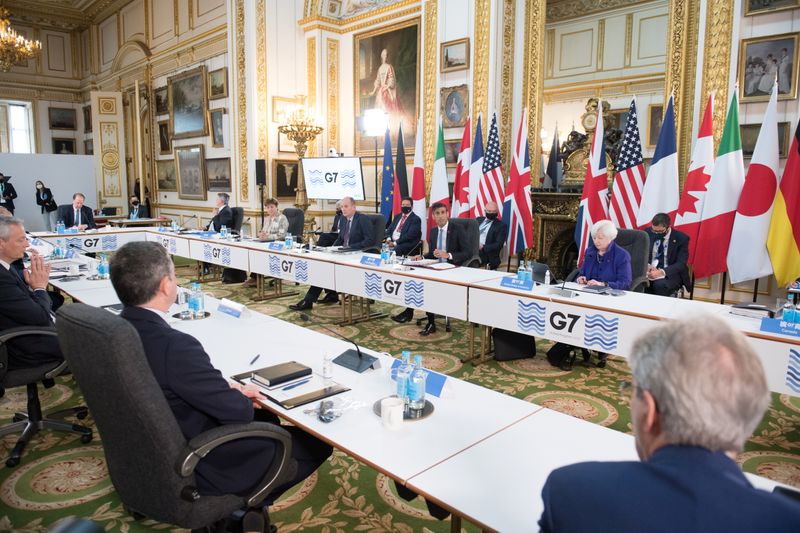By Leigh Thomas and David Lawder
(Reuters) - Finance Ministers from the Group of Seven (G7) rich nations reached a landmark accord on Saturday backing the creation of a global minimum corporate tax rate of at least 15%, an agreement that could then form the basis of a worldwide deal.
Such a deal aims to end what U.S. Treasury Secretary Janet Yellen has called a "30-year race to the bottom on corporate tax rates" as countries compete to lure multinationals.
WHY A GLOBAL MINIMUM TAX?
Major economies are aiming to discourage multinationals from shifting profits - and tax revenues - to low-tax countries regardless of where their sales are made.
Increasingly, income from intangible sources such as drug patents, software and royalties on intellectual property has migrated to these jurisdictions, allowing companies to avoid paying higher taxes in their traditional home countries.
GRAPHIC: Statutory corporate tax rates in OECD countries - https://graphics.reuters.com/OECD-TAX/oakpeldjxvr/chart.png
WHERE ARE THE TALKS AT?
The G7 accord feeds into a much broader, existing effort. The Organization for Economic Cooperation and Development has been coordinating tax negotiations among 140 countries for years on rules for taxing cross-border digital services and curbing tax base erosion, including a global corporate minimum tax.
The OECD and G20 countries aim to reach consensus on both by mid-year, but the talks on a global corporate minimum are technically simpler and less contentious. If a broad consensus is reached, it will be extremely hard for any low-tax country to try and block an agreement.
The minimum is expected to make up the bulk of the $50 billion-$80 billion in extra tax that the OECD estimates firms will end up paying globally under deals on both fronts.
HOW WOULD A GLOBAL MINIMUM WORK?
The global minimum tax rate would apply to overseas profits.
Governments could still set whatever local corporate tax rate they want, but if companies pay lower rates in a particular country, their home governments could "top-up" their taxes to the minimum rate, eliminating the advantage of shifting profits.
The OECD said last month that governments broadly agreed on the basic design of the minimum tax but not the rate. Tax experts say that is the thorniest issue, although the G7 accord creates strong momentum around the 15%-plus level.
Other items still to be negotiated include whether investment funds and real estate investment trusts should be covered, when to apply the new rate and ensuring it is compatible with U.S. tax reforms aimed at deterring erosion.
WHAT NEXT
A G20 meeting scheduled for Venice next month will see whether the G7 accord gets broad support from the world's biggest developing and developing countries.
Much still needs to be ironed out - including the metrics that will determine how and to which multinational companies the tax will be applied.
The G7 communique left open what will happen in the meantime to digital services taxes on big technology companies in various jurisdictions, which the United States wanted to be scrapped as soon as a deal was in place.
It said only that there should be "appropriate coordination between the application of the new international tax rules and the removal of all Digital Services Taxes".
Any final agreement could have major repercussions for low-tax countries and tax havens.
The Irish economy has boomed with the influx of billions of dollars in investment from multinationals. Dublin, which has resisted European Union attempts to harmonize its tax rules, is unlikely to accept a higher minimum rate without a fight.

However, the battle for low-tax countries is less likely to be about scuppering the overall talks and more about building support for a minimum rate as close as possible to its 12.5% or seeking certain exemptions.
GRAPHIC: Race to the bottom Race to the bottom - https://graphics.reuters.com/BRV-BRV/oakveldyxpr/chart.png